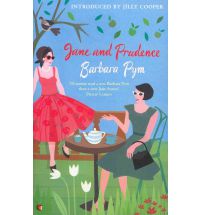This novel takes place in North Oxford and revolves around Miss Doggett, "a formidable woman of seventy (whose) chief work in life was interfering in other people's business", her meek yet sensible companion, Jessie Morrow, and Mr. Latimer, the young and handsome curate who comes to board with them. (Because all of Pym's novels need a curate!) Then there's the Clevelands: Francis, an established professor who's writing a book he'll never finish and who is also Miss Doggett's nephew, his placid wife, Margaret, and their daughter, Anthea, "a tall, slender girl with golden hair curling onto her shoulders and a gentle, pretty face, not too intelligent but just right for one whose only occupation in life so far had been to fall in love and be fallen in love with." And then there's Barbara Bird, one of Francis Cleveland's students at Oxford who happens to be falling in love with him.
At its heart, Crampton Hodnet is a novel of "unsuitable romantic entanglements" written in that perceptively witty and uniquely satirical Barbara Pym way. It's charming. And humorous. And I liked it a lot.
Happy Reading!







